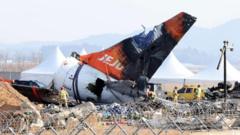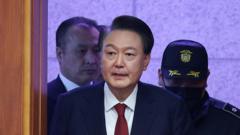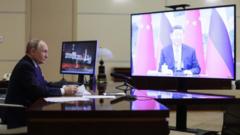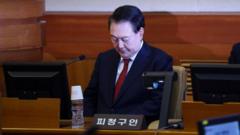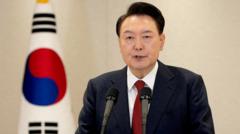In a dramatic unfolding of political turmoil, South Korea's Presidential Security Service (P.S.S) has become the primary line of defense for President Yoon Suk Yeol, who faces insurrection charges following his impeachment connected to a controversial martial law declaration. As the former president secludes himself within a fortified compound in Seoul, public sentiment overwhelmingly favors his removal, with a court granting a new warrant for his arrest.
Security Standoff: South Korea’s Presidential Crisis Intensifies

Security Standoff: South Korea’s Presidential Crisis Intensifies
As President Yoon Suk Yeol faces charges of insurrection, his security service remains firm in their support, highlighting tensions in South Korea's government.
The P.S.S., known for its rich history dating back to the military dictatorship era, successfully repelled an initial attempt by police and criminal investigators to detain Yoon. Outnumbered two-to-one, P.S.S. agents engaged in a tense five-and-a-half-hour standoff, ultimately questioning the legitimacy of the arrest warrant and forcing investigators to retreat.
Once a stealthy entity following South Korea's democratization, the P.S.S. has regained prominence—reminiscent of its past—under Yoon, who appointed a loyal confidant, Kim Yong-hyun, as its chief. With hundreds of bodyguards and anti-terrorism specialists prepared for confrontation, the P.S.S. warns of potential violence should authorities attempt another arrest. Despite Yoon's suspension, his security team pledges loyalty, asserting he remains the “sole elected leader” of the nation.
As the political drama unfolds, the implications for governance and public trust in South Korean institutions loom large.
Once a stealthy entity following South Korea's democratization, the P.S.S. has regained prominence—reminiscent of its past—under Yoon, who appointed a loyal confidant, Kim Yong-hyun, as its chief. With hundreds of bodyguards and anti-terrorism specialists prepared for confrontation, the P.S.S. warns of potential violence should authorities attempt another arrest. Despite Yoon's suspension, his security team pledges loyalty, asserting he remains the “sole elected leader” of the nation.
As the political drama unfolds, the implications for governance and public trust in South Korean institutions loom large.






